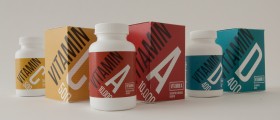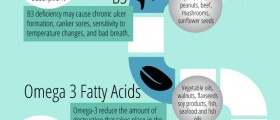
Vitamins and minerals are essential nutrientsrequired for normal growth and development of the body. These nutrients arefound in food. Each vitamin and mineral has a unique role in maintaininghealth.
Vitamins
Vitamins are organic compounds. There are twotypes of vitamins: fat-soluble vitamins that are stored within the fat tissuein the body and water-soluble vitamins that are not stored in the body and needto be replaced often.
Vitamin AThis fat-soluble vitamin is important formaintaining healthy skin and good vision. Since it has antioxidant properties,it is essential for the immune system. Vitamin A can be found in liver, milk,cheese, carrots, apricots and broccoli.
Vitamins B
This group consists of 8 vitamins: B1, B2(riboflavin), B3, B5 (panthothenic acid), B6, B7 (biotin), B9 (folic acid) andB12. B-complex vitamins are required for proper red blood cell formation andhave important role in metabolic processes. Sources of these vitamins arebeans, peas, whole grains, milk, yogurt, eggs, leafy green vegetables, fish andseafood.
Vitamin C
Vitamin C is required for normal cell tissueregeneration. It promotes wound healing and helps the body to fight infections.Foods rich in this vitamin are: citrus fruits, tomatoes, sweet pepper, kiwifruit, broccoli and sprouts.
Vitamin D
This vitamin is needed for development of bonesand teeth, muscle strength and healthy skin. It is also required for absorptionof calcium and phosphorus. Vitamin D can be found in egg yolk, fish, milk,liver and fortified cereals.
Vitamin EVitamin E act as antioxidant and it is importantfor maintaining function of the heart, skin, circulation, liver, eyes andnervous system. It is also involved in formation of red blood cells. Sources ofvitamin B are nuts, seeds, fish, chicken, wheat and oats.
Vitamin K
This vitamin is required for blood clotting. Richsources of vitamin K include spinach, broccoli, cabbage, soybean oil, milk andyogurt. Minerals
Minerals are inorganic elements that body requiresin trace amounts. Calcium is important for development of bones and teeth, andhealthy functioning of the heart and muscles. Chromium promotes the action ofinsulin to regulate blood sugar. Copper helps in blood cell formation and isneeded for the nervous, cardiovascular and immune system functioning. Iodine isrequired for normal thyroid function and energy production. Iron is importantin blood production. Magnesium is required for energy production, use ofcalcium and regulation of potassium levels. Molybdenum is needed for breakdownof proteins. Potassium has a vital role in healthy kidney, heart and nervoussystem function. Selenium is antioxidant that keeps artery and tissue elastic.Zinc is important for the immune system and growth.

















Your thoughts on this
Loading...